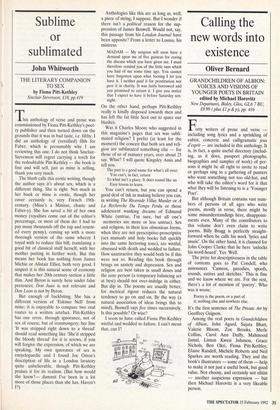Sublime or sublimated
John Whitworth
THE LITERARY COMPANION TO SEX by Fiona Pitt-Kethley
Sinclair-Stevenson, f18, pp.419
This anthology of verse and prose was commissioned by Fiona Pitt-Kethley's poet- ry publisher and then turned down on the grounds that it was in bad taste, i.e. filthy. I did an anthology of (versified) filth for Faber, which is presumably why I am reviewing this one. I do not think Sinclair- Stevenson will regret carrying a torch for the redoubtable Pitt-Kethley — the book is fine and will sell, just as mine is selling, thank you very much.
The blurb calls this erotic writing, though the author says it's about sex, which is a different thing. She is right. Not much in her book or mine is erotic, though her cover certainly is, very French 19th- century. (Mine's a Matisse, chaste and Faber-y). She has saved a bit of her own money (royalties come out of the editor's percentage, or most of them do: I had to pay many thousands off the top and resent- ed every penny), coming up with a more thorough version of the same wheeze I toyed with to reduce this bill, translating a good bit of classical stuff herself, with her mother putting in further work. But this means her book has nothing from James Michie or Alistair Elliot, both very good. I suspect it is this natural sense of economy that makes her 20th-century section a little thin. And Byron is surely here under false pretences; Don Juan is not relevant and Don Leon is not by Byron.
But enough of backbiting. She has a different version of 'Eskimo Nell' from mine; it is enjoyable to compare two oral routes to a written artefact. Pitt-Kethley has one error, through ignorance, not of sex of course, but of ironmongery; her line `It was stripped right down to a thread' should read something like `She'd stripped the bloody thread' for it is screws, if you will forgive the expression, of which we are speaking. My own ignorance of sex is encyclopaedic and I found Joe Orton's description of life in a London lavatory quite unbelievable, though Pitt-Kethley praises it for its realism. (But how would she know?— dammit I've been in a lot more of those places than she has. Haven't I?) Anthologies like this are as long as, well, a piece of string, I suppose. But I wonder if there isn't a political reason for the sup- pression of James Boswell. Would not, say, this passage from his London Journal have been apposite? From a letter to Louisa, his mistress: MADAM — My surgeon will soon have a demand upon me of five guineas for curing the disease which you have given me. I must therefore remind you of the little sum which you had of me some time ago. You cannot have forgotten upon what footing I let you have it. I neither paid it for prostitution nor gave it in charity. It was fairly borrowed and you promised to return it. I give you notice that I expect to have it before Saturday sen- night.
On the other hand, perhaps Pitt-Kethley really is kindly disposed towards men and has left the fat little Scot out to spare our blushes.
Was it Charles Moore who suggested in this magazine's pages that sex was subli- mated religion? I prefer (at least for the moment) the conceit that both sex and reli- gion are sublimated something else — for those of us of maturer years, over about 25 say. What? I will quote Kingsley Amis and tell you.
The past is a good name for what's all over; You can't, in fact, return To what isn't a place. It does sound like an Easy lesson to learn.
You can't return, but you can spend a good deal of ink in making believe you can, in writing The Riverside Villas Murder or A La Recherche Du Temps Perdu or those adolescent wanking dreams of Edmund White (untrue, I'm sure, but all one's memories are more or less untrue). Sex and religion, in their less obnoxious forms, when they are not prescriptive-proscriptive (sex manuals and holy books fall quickly into the same hectoring tone), are wistful, obsessed with death and wedded to failure. How unattractive they would both be if this were not so. Reading this book through brings on anxiety and depression. Sex and religion are best taken in small doses and the sane person (a temporary balancing act at best) should not over-indulge in either. But dip in. The poems are usually better, for metrical rigour reduces the natural tendency to go on and on. By the way (a natural association of ideas brings this to mind), Boswell says five times successively. Is this possible? Or wise?
I seem to have called Fiona Pitt-Kethley wistful and wedded to failure. I can't mean that, can I?


























































 Previous page
Previous page